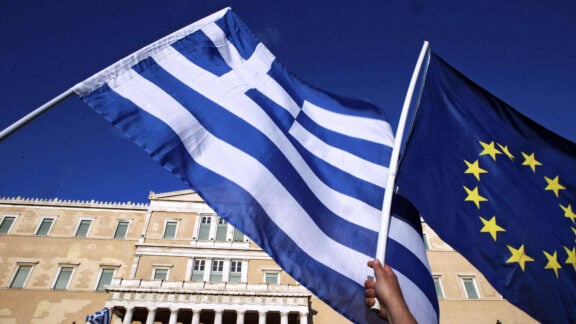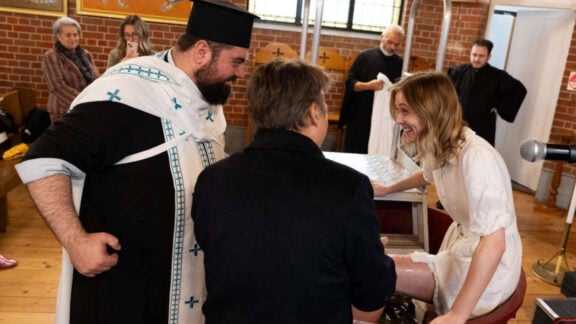When AEK Athens dropped out of the Superleague and tumbled down to the third division in 2013, declaring bankruptcy and attempting to start over, the slogan that accompanied them was ‘ερχόμαστε’ (essentially, “we’re on our way back”). It was an understandable statement of intent. Under AEK legend and Euro 2004 hero Traianos Dellas, the team effectively breezed through the third division and made short work of the second division as well, before triumphantly returning to the top tier. Just two years after a nightmarish fall from grace, AEK was back and, according to big-boss-man Dimitris Melissanidis, they were gunning for Olympiakos, the perennial overlord of Greek football. They had a young squad, a promising coach and money to burn. It couldn’t go wrong.
Fast forward to 2016 and that air of optimism has turned a bit stale. Despite a successful cup run in its first season back in the Superleague − which saw the side vanquish Olympiakos in the final and lift the Greek cup – and a chance to get back into the European competition pool, AEK are in turmoil. Dellas is of course long gone, the much-advertised young core of the team has flattered to deceive and the dream of a revamped stadium at the site of the team’s old home in Nea Philadelphia has hit roadblock after roadblock, with local mayor Aris Vasilopoulos proving a tough opponent even for the bullish Dimitris Melissanidis.
Current coach Jose Morais, the latest individual to step into the managerial merry-go-round at AEK, is trying to get to grips with the situation, but whether he will have the time to do so is doubtful. Since Dellas was booted out the door, AEK has burned through coaches like it’s going out of style. Gustavo Poyet, the one-time Chelsea player and Sunderland coach, replaced Dellas but lasted less than half a season, before AEK legend Stelios Manolas stepped in, guided the team to a cup final win, then promptly stepped down. The managerial void was then filled with Timuri Ketsbaia, an unpopular choice among fans who were highly sceptical about his defensive football mindset, but he didn’t last long either, paying the cost for AEK’s very poor start to the season (which saw it crash out of the Europa League qualifiers against St Etienne) as well as some pretty uninspiring football on the pitch.
And that brings us back to Morais, who is now the fifth manager AEK has placed at the helm of its shaky ship in three years, with manager number six already materialising on the horizon. The Portuguese coach so far seems to be an odd fit for the Athenians, a journeyman of a professional who has gone through nearly twenty teams as both coach and assistant coach since 1999 when he began his managerial career. Although he has worked side by side with Jose Mourinho at Inter Milan, Real Madrid and Chelsea, the jury is still out on his abilities as a first team manager, with Morais showing a rather lax attitude towards defensive organisation and concentrating on offensive expression.
Should he leave – rumours are rife that Marinos Ouzounidis has already been tentatively approached – it’s almost certain that the blame of failure will be placed squarely at his feet, just as it was with the previous coaches that have already been booted out of the Olympic Stadium. It is, of course, hardly his fault. Morais, a coach still learning his trade and with a managerial record that hardly inspires confidence, did not blackmail the AEK officials into handing him the job. It was given to him. Dusan Bajevic, the coach under whom AEK won its last league title, is now director of football and effectively the man who runs the team. He, too, has proven to be a rather bad fit for his post. Hard-headed but with little experience in handing a position that requires a lot more than organising coaching drills and deciding upon a system of play, Bajevic has so far failed to galvanise a team structure that appears to be highly problematic. With the youth academy system grinding to a halt and the first team appearing completely rudderless, it’s only his close friendship with Melissanidis that appears to be keeping him at his post.
If you’re noticing a dysfunctional pattern forming here, then you’re not wrong. Melissanidis, for all his talk of getting the team “back to where it belongs”, has not yet grasped that times and indeed football itself has changed dramatically since he was last owner of this team, back in 1995. He seems to have bet all his chips on the re-building of the Nea Philadelphia stadium, but with that plan looking more and more like a pipe dream (though it needs to be said, through no real entrepreneurial fault of his own), sooner or later he will have to come up with an alternate plan, a plan that will have to show that he understands how a modern football team is run and that in order for such an enterprise to be handled properly, he will need a lot more than his old friends and a long line of managers to take the blame.








